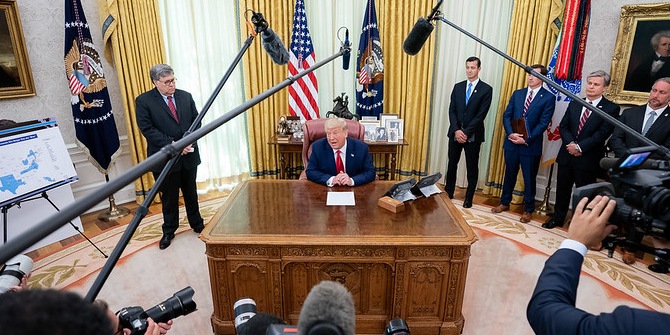

 As the 2022 midterm elections approach, volunteers can play a significant role for the Democratic or Republican parties at the county level. In new research, Lee Hannah, Kevin Reuning, and Anne Whitesell look at how easy it is to volunteer for a local political party, and what groups of people find it easier to volunteer. They find that local chapters are more willing to respond to approaches from women and white potential volunteers and if they are an in electorally competitive counties.
As the 2022 midterm elections approach, volunteers can play a significant role for the Democratic or Republican parties at the county level. In new research, Lee Hannah, Kevin Reuning, and Anne Whitesell look at how easy it is to volunteer for a local political party, and what groups of people find it easier to volunteer. They find that local chapters are more willing to respond to approaches from women and white potential volunteers and if they are an in electorally competitive counties.
Campaigns for the midterms are now in full swing with candidates for state and federal elections expected to spend billions on the airwaves. President Biden and Vice President Harris have stepped up their efforts on the trail, as has former President Trump. While the focus is often on the headlines and the air wars, individuals looking to get involved at the grassroots level may turn to their local political parties to get involved. But are the parties ready to mobilize eager volunteers?
The role local parties play in organizing volunteers
In our new research we shed light on the role local parties play when it comes to organizing volunteers. To do this, we used an experimental method called an audit or correspondence study. After searching for the contact information for Republican and Democratic party chapters in each of the 3,141 US counties, we sent a short email to the 4,000 email addresses that we collected to express interest in getting involved in the upcoming election. The emails were purportedly sent from email addresses associated with one of four randomly assigned profiles (a white male, white female, black male, black female). The experiment was designed to measure whether local party chairs would respond differently to potential volunteers’ email based on their gender or race or whether we’d see different response rates based on characteristics of the county we were emailing.
Most emails go unanswered, and when they do respond, parties respond less frequently to Black volunteers
Of the 4,000 emails that we sent, we received a response from only 40 percent of Democratic party leaders and 32 percent of Republican leaders.
As Figure 1 shows, both parties were more likely to respond to white volunteers. Democrats responded to 43 percent of emails from white volunteers and only 37 percent of emails from Black volunteers. The gap is even wider for Republicans, responding to 36 percent of emails from white volunteers and only 28 percent from Black volunteers. Our results are in line with many studies that have found a disparity in response rate from political elites based on the racial identity of the requester.
Figure 1 – Response rates by gender and race

But the story is a little more complex for Democrats. Democrats are more likely to respond to white volunteers in counties with small Black populations. As the Black population increases, however, Democratic leaders become more responsive to emails from Black volunteers. This suggests that Democratic leaders look for volunteers who reflect the demographics of their communities.
Parties respond more frequently to women and parties in more competitive counties are more likely to respond
We anticipated that Democrats would respond more frequently to women volunteers, given the importance of women to the Democratic base. Our research found that both Democrats and Republicans were more likely to respond to women than to men, though the difference for Republicans was smaller and not statistically significant.
It also helps to live in a competitive county. Local party chairs in counties where the presidential vote between Trump and Clinton was closer to 50/50 were more likely to respond to our inquiry. In competitive counties, 39 percent of Democratic chairs replied compared to a 29 percent response rate in counties that were decidedly Democratic or Republican (greater than 75 percent of the 2016 presidential vote share). The same was true for Republicans, where the response rate dropped from 34 percent in competitive counties to 29 percent in solidly Democratic or Republican counties. Presumably, volunteers are more valuable in areas where both parties are competing in tight races.

Photo by Elissa Garcia on Unsplash
What this means for the 2022 midterms
Given that 2020 was a presidential election year and that the pandemic had people more online than usual, it is hard to be optimistic about local parties’ ability to respond to volunteers in 2022. We also found evidence of racial discrimination consistent with previous research.
At the same time, we treated each county as equal when measuring responses – even though more than half of US residents live in 143 counties. From this, we do find that county chairs in more populous areas are more responsive. Presumably many potential volunteers live in counties where the parties have greater resources and are more likely to respond. Furthermore, we do not know whether specific campaigns would be more responsive. Potential volunteers might have had better luck reaching out directly to the presidential campaigns or getting plugged in with broader networks of interest groups and activists.
Regardless, we hope that parties will take note and shore up their local organizations. This is particularly true for the Democrats who are playing catch-up in competing for state legislative races. Engagement in local politics can push back against nationalized politics and set volunteers on a path towards lifelong civic engagement.
- This article is based on the paper, ‘The Party Replies: Examining Local Party Responsiveness to Prospective Campaign Volunteers’ in Political Research Quarterly.
- Please read our comments policy before commenting.
- Note: This article gives the views of the author, and not the position of USAPP – American Politics and Policy, nor the London School of Economics.
- Shortened URL for this post: https://bit.ly/3Dk6Ysi






